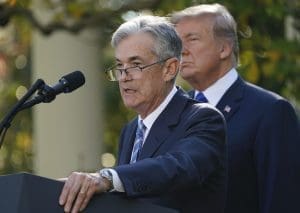Trump’s Fed chair contradicts him: Economic recovery 'going to take a while'
‘I think certain parts of the economy will find it very difficult to have really a lot of activity,’ Federal Reserve Chair Jerome Powell said.

Federal Reserve Chair Jerome Powell has painted a grim picture of the future of the United States economy, saying that the coronavirus-fueled unemployment rate could climb past levels seen during the Great Depression, and that the economic recovery will be more uneven and slower than Donald Trump has claimed.
Powell made the comments in an interview with “60 Minutes” that aired Sunday night, Asked whether he thought 25% could be the peak unemployment rate in the United States in the next few months, Powell responded, “I think there’re a range of perspectives. But those numbers sound about right for what the peak may be.”
In 1933, at the peak of the Great Depression, the country’s unemployment rate was 24.9%.
“This is a time of great suffering and difficulty,” Powell told CBS News’ Scott Pelley. “And it’s come on us so quickly and with such force, that you really can’t put into words the pain people are feeling and the uncertainty they’re realizing. And it’s going to take a while for us to get back.”
Powell added that while some sectors of the economy will recover once social distancing measures are lifted, other parts of the economy, such as travel and entertainment, won’t immediately bounce back from the coronavirus downturn.
“I think certain parts of the economy will find it very difficult to have really a lot of activity,” Powell said. “The parts that involve very close — people being in the same place, very close together. Those parts of the economy will be challenged until people feel really safe again.”
Powell was less optimistic than Trump, who has said that the economy will recover quickly once states start lifting social distancing measures put in place to stop the spread of the coronavirus and people move past the pandemic.
“Once we OPEN UP OUR GREAT COUNTRY, and it will be sooner rather than later, the horror of the Invisible Enemy, except for those that sadly lost a family member or friend, must be quickly forgotten,” Trump tweeted April 8. “Our Economy will BOOM, perhaps like never before!!!”
Powell has said Congress needs to pass more relief aid to stave off worse economic impacts.
The Democratic-controlled House passed a $3 trillion relief package last week that included more direct payments to Americans. But the Republican-controlled Senate is unlikely to take the bill up, and Trump has threatened to veto it.
Senate Majority Leader Mitch McConnell has said he doesn’t feel any sense of “urgency” to pass more relief bills.
Powell said that he has faith that eventually the situation would improve and that he “wouldn’t bet against the American economy.” However, he said, the recovery could be slow.
“This economy will recover. And that means people will go back to work. Unemployment will get back down. We’ll get through this,” Powell said. “It may take a while. It may take a period of time. It could stretch through the end of next year. We really don’t know. We hope that it will be shorter than that, but no one really knows.”
Published with permission of The American Independent Foundation.
Recommended

Biden calls for expanded child tax credit, taxes on wealthy in $7.2 trillion budget plan
President Joe Biden released his budget request for the upcoming fiscal year Monday, calling on Congress to stick to the spending agreement brokered last year and to revamp tax laws so that the “wealthy pay their fair share.”
By Jennifer Shutt, States Newsroom - March 11, 2024
December jobs report: Wages up, hiring steady as job market ends year strong
Friday’s jobs data showed a strong, resilient U.S. labor market with wages outpacing inflation — welcome news for Americans hoping to have more purchasing power in 2024.
By Casey Quinlan - January 05, 2024
Biden’s infrastructure law is boosting Nevada’s economy. Sam Brown opposed it.
The Nevada Republican U.S. Senate hopeful also spoke out against a rail project projected to create thousands of union jobs
By Jesse Valentine - November 15, 2023








































































